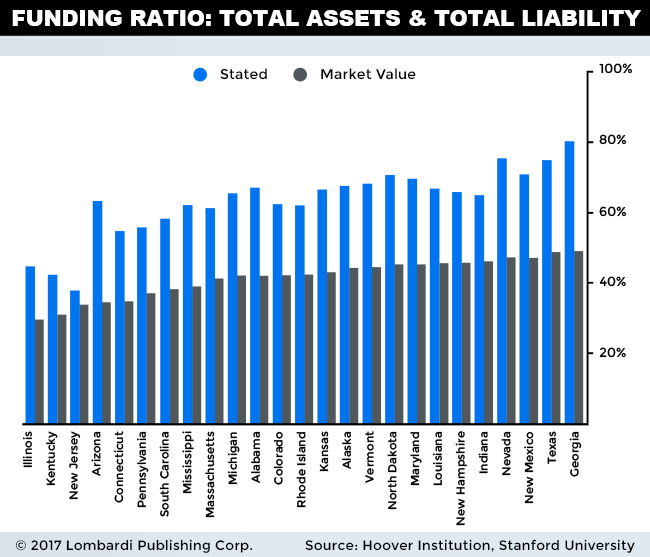Fears Rise that U.S. Debt Crisis Will Unfold as More States Go Underwater
The U.S. debt crisis has been spreading to individual cities and states. Hartford, Connecticut just had its credit rating downgraded to “deep junk” a mere two months after the city’s credit rating was last downgraded. This suggests that, far from stopping the bleeding, the hemorrhaging is getting worse.
S&P Global Ratings didn’t just downgrade the capital city’s rating by one notch, as per normal. The agency downgraded Hartford’s rating four notches deeper into junk territory, from BB- to CC. Says S&P Global Ratings credit analyst Victor Medeiros, “The downgrade to ‘CC’ reflects our opinion that a default, a distressed exchange, or redemption appears to be a virtual certainty”. (Source: “Connecticut Capital Hartford Downgraded To Deep Junk, S&P Says ‘Default Virtual Certainty’,” Zero Hedge, September 26, 2017.)
Also Read: How Much Is the U.S. Debt Ceiling & How High Will It Go Under Trump Presidency?
Hartford isn’t some struggling backwater. It’s the capital city of America’s richest state, on a per-capita basis. One would think that if it could happen there, it can happen anywhere.
Hartford joins the growing list of U.S. cities and states with major fiscal problems. Illinois, Kentucky, and Puerto Rico have all experienced either credit rating downgrades or budget crises (or both) in the past year.
Now there’s chatter that Chicago, Illinois is only one notch above junk status, with a $16.0-billion budget shortfall that it can’t handle. The state has already increased taxes significantly since the Great Recession, causing many residents to flee the state. The Chicago government will probably attempt to tax more, but all they’ll get is dwindling returns and more resident flight. (Source: “Illinois’ unpaid bill backlog hits a record $16 billion,” Reuters, September 19, 2017.)
Will State Governments Require A Bailout?
Some individual states and counties are in big trouble. Unlike the federal government, these jurisdictions can’t simply print their own money to pay their bills. They can issue debt, but the capital markets are much more discerning. Individual states don’t have the “full faith and credit” of the entire U.S. economy backing them up.
To put the severity of the situation in numbers, a 2014 State Budget Solutions (SBS) State Debt Study showed that state governments face a combined $5.1 trillion in debt. That’s about $16,178 per person, or 33 percent of annual gross state product. Keep in mind, these are four-year-old numbers; the current numbers are likely worse. (Source: “Report: State debts top $5 trillion,” Human Events, January 14, 2014).
Keep in mind, these growing problems are manifesting themselves in supposedly good economic times. The potential for profound degradation exists once the economy starts turning downhill.
The collective nature of the problem could spark a U.S. debt crisis should the U.S. government be forced to conduct bailouts. As states see continuous credit rating downgrades, they’ll have a more difficult time issuing debt, thus compounding the problem. Raising state taxes won’t help much either, as businesses and residents will simply flee to cheaper locales.
The U.S. national debt is already more than $20.0 trillion—and rising—while the U.S. dollar index has lost about eight percent this year. Any bailout would likely be done on an individual basis, but it won’t do the deficit any favors. Pushed far enough, a growing U.S. deficit could force the U.S. credit rating lower, presenting its own list of nasty problems.
Unfortunately, state problems will only worsen as the economy turns. This threatens to drag Uncle Sam into a quagmire that it would like to avoid.







